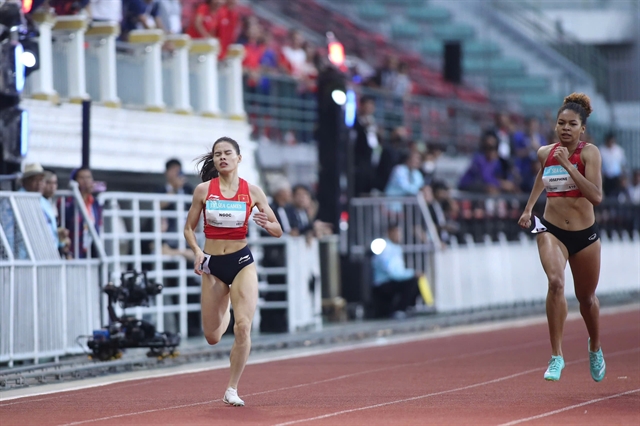 Sports
Sports

 |
| Đông Á Thanh Hoá FC playing in the 2023 National Cup Final against Viettel FC, one of the football club’s most recent cup victory, and could well be the final one if the downturn is not resolved. VNA/VNS Photo Bùi Cương Quyết |
Anh Đức
When a club can’t sign a single player for three consecutive transfer windows, that’s not a hiccup, it’s a flaming warning. That’s exactly the predicament now facing Đông Á Thanh Hóa FC after receiving a harsh sanction from FIFA.
The club has been barred from registering any new players, domestic or foreign, beginning November 5 and extending across three transfer windows. This isn’t just a financial blip; it strikes at the heart of the club’s ability to compete and stay afloat in the V.League.
The root of the problem lies in a contract dispute with Brazilian defender Igor Silva. He played seven matches for Thanh Hóa in the 2024-25 season, scored once, then departed. But the club allegedly failed to fulfil promised payments. Silva lodged a complaint with FIFA and the governing body issued the registration ban until Thanh Hóa settles the matter.
For a club already bruised by financial strain, reports of delayed salaries and frozen accounts after the arrest of former Chairman Cao Tiến Đoan, this penalty lands at the worst possible moment. Thanh Hóa sits near the bottom of the V.League table, its resources stretched, its ability to rebuild cut off just when it needs reinforcement most.
Why does this matter so much? Because football is more than the eleven on the pitch—it’s squad depth, rotation, adaptability and the ability to adjust when players go down or lose form. A three-window transfer embargo makes that almost impossible. If one central defender gets injured, there’s no signing window left to call on. No foreign recruit, no youth wake-up call, only the existing cast.
Importantly, this is not the first time Thanh Hóa has found itself in FIFA’s cross-hairs. Earlier in 2025 the club was hit with a ban over unpaid wages to former coach Svetislav Tanasijevic. That case was resolved after payment and the ban lifted. But the recurrence suggests deeper systemic issues—delayed payments, weak governance, empty sponsor coffers.
The consequences of this punishment ripple immediately. Loss of transfer access dampens investment, lowers morale and shrinks options. When rivals strengthen and rotate players, Thanh Hóa must rely on what it has now or ‘what it used to have,’ some might say. Meanwhile, fans, sponsors and younger players see the message: this club is on borrowed time unless the foundations are fixed.
For the V.League, this is a cautionary tale. It shows that sporting ambition and on-field drama can vanish if the off-field house isn’t in order. Clubs must not just chase results; they must build credible sustainable operations. When FIFA sanctions bite, it’s the fans who suffer, the young players who stagnate and the league that weakens.
Thanh Hóa’s short-term task is survival, use what’s on hand, keep morale, avoid further meltdown. But the bigger challenge is long-term reform: clear financial discipline, solid contracts, honest accounting. Until then, every match will carry a shadow: the one cast by a ban they almost allowed to happen themselves.
History will remember Thanh Hóa for more than its trophies; it may remember how it handled adversity. The way out is unpaid wages paid, files submitted, ban lifted. Only then will the club regain its freedom and rejoin competition, not just in name but in strength.
For now, Đông Á Thanh Hóa must play with caution, not just to win games, but to prove that once the club was punished, it learned something. Because the greatest loss isn’t three windows of no signings, it’s three seasons of decline that follow. — VNS




